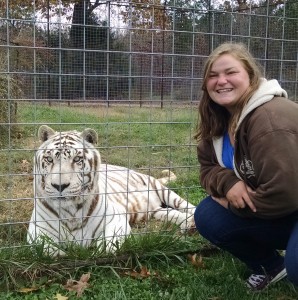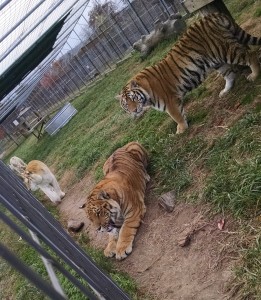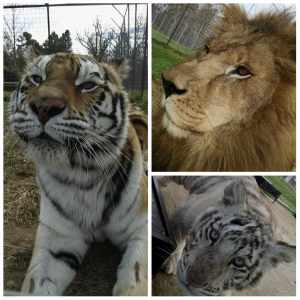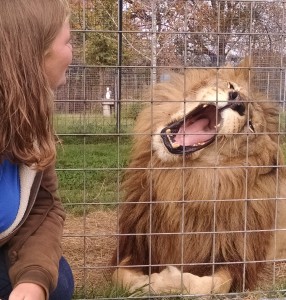 Jessie Sayre ’16 studied Psychology and Biology while at Puget Sound. But you might say she majored in cute, furry animals. A self-proclaimed “Zoo Enthusiast,” Jessie loves puppies, pandas, and pumas alike.
Jessie Sayre ’16 studied Psychology and Biology while at Puget Sound. But you might say she majored in cute, furry animals. A self-proclaimed “Zoo Enthusiast,” Jessie loves puppies, pandas, and pumas alike.
But don’t assume that her interest in the animal kingdom is only fur deep. Jessie is passionate about conservation, education about the plight of privately-owned exotic animals, and improving the lives of captive animals.
While in school, Jessie gained exposure to the zoo as a potential workplace through her part-time job at Tacoma’s Point Defiance Zoo. Though her role was in visitor services, she took the opportunity to learn about the animals, connect with zoo keepers, and explore the field—solidifying her passion for working in and with zoos.
When Jessie found a posting in InternshipLink for Turpentine Creek Wildlife Refuge, she saw a chance to gain hands-on experience working as an Exotic Cat Intern.
CES: What is a typical day like?
 Jessie: Mornings usually start with cleaning enclosures and checking in on the animals, but they can also be spent giving tours to visitors, or preparing food and medication for the 115 animals under the interns’ care.
Jessie: Mornings usually start with cleaning enclosures and checking in on the animals, but they can also be spent giving tours to visitors, or preparing food and medication for the 115 animals under the interns’ care.
Afternoons involve a variety of projects—from building habitats, to landscaping, to preparing reports. Every day is different, so there’s no chance to get bored!
CES: What do you most enjoy?
Jessie: I enjoy learning about each cat’s personality and quirks. I’ve never been around this many big cats before, so it’s been wonderful watching them each interact with different objects or people and to observe their reactions and attitudes (especially because I studied psychology and did a lot of research on personality).
CES: What has been most challenging?
Jessie: I’ve worked in customer service positions before, and I enjoy working with people. But honestly, the most difficult part of this role is interacting with the public. It’s hard to have such a passion for animals and then to encounter visitors who don’t quite understand why we do what we do.
Some guests come to the sanctuary hoping to enter the enclosures with tigers or lions, or wanting to sit and pet cubs. And no matter how much time we spend explaining why that isn’t safe or healthy for the animals, they don’t see the big picture.
It can be frustrating. But we work hard to raise awareness about the dangers of exotic animal ownership. And for the most part, I end my tours knowing that I’ve made a positive impact—that the guests walk away with a lot of information not only about big cats, but about what they can do to help improve the situation.
CES: How has this experience influenced your career goals?
Jessie: I’ve become acutely aware of the huge need for sanctuaries like Turpentine that can step in and rescue animals.
Nearly 75% of the animals we rescue come from situations of neglect, abuse, and unsafe living conditions. It breaks my heart to think about how many more big cats and other exotic animals are living in backyards across the U.S., unable to get the care that they need—an estimated 4,000 tigers alone.
The lack of awareness about this situation is appalling, and I think I would enjoy an opportunity that would allow me to do outreach and to work on saving as many animals as possible. But conservation work is also really important. So working for AZA zoos is still definitely an interest.
CES: What misconceptions did you have about working with big cats before your internship?
 Jessie: I didn’t realize that they make such a variety of noises! Lions especially. They can carol with a lot of gusto, but they also coo and groan and complain and stomp around. Same thing with tigers. I didn’t expect a solitary species to have such an interesting noise to express affection, or that they would use it as often as they do–chuffing. Look it up. It’s absolutely adorable.
Jessie: I didn’t realize that they make such a variety of noises! Lions especially. They can carol with a lot of gusto, but they also coo and groan and complain and stomp around. Same thing with tigers. I didn’t expect a solitary species to have such an interesting noise to express affection, or that they would use it as often as they do–chuffing. Look it up. It’s absolutely adorable.
I also didn’t think that I would pick up their noises and echo them back to the animals as much as I do. There are even times when I respond to people or my dog with a chuff or a coo!
CES: What are your thoughts about doing a post-grad internship? Would you do it again?
Jessie: Doing an internship after graduation can be really hard, especially considering that it’s not always socially acceptable to graduate and then move into a low-(or non)-paying position to gain experience.
That being said, I would never change my decision. My 6 months at Turpentine have opened my eyes to what is happening in the U.S. regarding the exotic animal trade. I’ve also had the opportunity to work with all of these amazing animals, and to learn so much from them.
CES: What advice do you have for Logger students who’d like to work in this field?
Jessie: If you want to work in the animal field, it’s imperative that you get animal experience—zoos look primarily at the internships you’ve had and which species you’ve worked with. There are several interns here who’ve done 3-5 internships prior to working at Turpentine, who are also looking to be zookeepers, and they all know interns from previous internships who are striving to do the same. It’s an incredibly competitive field, but worth it!
Want to find an internship that fits your passion or makes a positive impact in the animal or human world? Make an appointment to chat with a CES career advisor! 253.879.3161
© 2017 Career and Employment Services, University of Puget Sound
Photos provided by Jessie Sayre